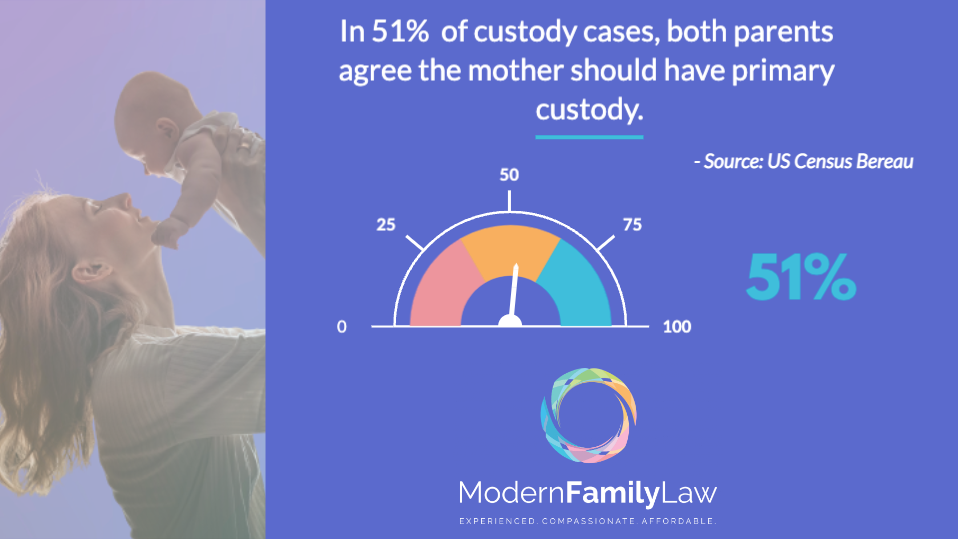CHILD VISITATION ATTORNEYS
IN CALIFORNIA
At Modern Family Law, our California child custody attorneys prioritize compassion while assisting parents in navigating the legal system and establishing equitable and suitable parenting plans for their children. With their extensive experience and knowledge, our lawyers empower parents by clarifying their rights and responsibilities and representing them effectively in court proceedings.
At our law firm, our child custody lawyers offer assistance with a range of child visitation matters, such as developing a parenting plan, altering an existing plan, and enforcing court orders. Below, you can familiarize yourself with child visitation in California, which includes:

Recognizing that every case is unique, our skilled California child custody attorneys urge you to connect with them and share the specifics of your case. This allows them to offer you the appropriate guidance and support. Whether you're a parent seeking to create or alter a child visitation schedule or require help with a child custody dispute, our California attorneys are dedicated to standing by you and safeguarding your relationship with your child.
WHAT IS
CHILD VISITATION IN CALIFORNIA?
Child visitation in California refers to the time that a non-custodial parent spends with their child after a divorce or separation. It is a legal agreement between parents that outlines when and how the non-custodial parent can have access to the child. The purpose of child visitation is to promote and maintain a healthy relationship between the non-custodial parent and their child, even though the child may primarily reside with the custodial parent. The specific terms of child visitation, such as the frequency, duration, and location of visits, are typically determined by a court order or a parenting plan agreed upon by the parents.
In California, child visitation rights are not automatic, and parents must petition the court to establish or modify visitation arrangements. Parents are encouraged to work together and develop a parenting plan that addresses the needs of the child and ensures that both parents have a role in their upbringing. However, if parents cannot agree on visitation arrangements, the court will intervene and make a determination based on the best interests of the child.
HOW IS CHILD VISITATION
DETERMINED IN COLORADO
Child visitation in California is usually determined through either a court order or a parenting plan agreed upon by both parents. If the parents cannot agree on visitation arrangements, the court will make a determination based on the best interests of the child.
In California, the best interests of the child are the primary consideration in determining child visitation. The court will consider a variety of factors when making a determination, including the child's age, health, and emotional well-being, the relationship between the child and each parent, the ability of each parent to provide for the child's basic needs, and any history of abuse or neglect. The court may also consider the child's wishes if they are old enough to express a preference.
When determining child visitation, the court may order supervised visitation if it determines that the non-custodial parent poses a risk to the child's safety or well-being. Supervised visitation means that a neutral third party, such as a social worker or a family member, must be present during visits to ensure that the child is not at risk of harm.
It is important to note that child visitation orders can be modified if there are significant changes in the circumstances of the parents or the child. For example, if one parent moves to a different city or state, the visitation schedule may need to be modified to accommodate the new location.
Overall, child visitation in California is determined based on the best interests of the child. With the guidance of an experienced family law attorney, parents can navigate the legal system and develop a visitation arrangement that meets the needs of their child while protecting their rights as parents.
Best Interest of the Child Considerations
“In making a determination of the best interests of the child in a proceeding described in Section 3021, the court shall, among any other factors it finds relevant and consistent with Section 3020, consider all of the following:
(1) The health, safety, and welfare of the child.
(2) (A) A history of abuse by one parent or any other person seeking custody against any of the following:
(i) A child to whom the parent or person seeking custody is related by blood or affinity or with whom the parent or person seeking custody has had a caretaking relationship, no matter how temporary.
(ii) The other parent.
(iii) A parent, current spouse, or cohabitant, of the parent or person seeking custody, or a person with whom the parent or person seeking custody has a dating or engagement relationship.
(B) As a prerequisite to considering allegation of abuse, the court may require independent corroboration, including, but not limited to, written reports by law enforcement agencies, child protective services or other social welfare agenceis, courts, medical facilities, or other public agencies or private nonprofit organizations providing services to victims of sexual assault or domestic violence.
(3 The nature ans amount of contact with both parents, except as provided in Section 3046.
(4) The habitual or continual illegal use of controlled substances, the habitual or continual abuse of alcohol or habitual or continual abuse of prescribed controlled substances by either parent.”
WHAT ARE THE TYPES OF
VISITATION IN CALIFORNIA?
In California, there are different types of child visitation arrangements that can be established through either a court order or a parenting plan agreed upon by both parents. The specific terms of visitation can vary widely, depending on the unique needs of the child and the circumstances of the parents. Some of the most common types of child visitation arrangements in California include:
1. Unscheduled Visitation: Also known as reasonable visitation, this type of visitation allows the non-custodial parent to visit with the child whenever it is reasonable and mutually agreed upon by both parents. This type of visitation arrangement is often used when parents are on amicable terms and can work together to establish a schedule that meets the needs of their child.
2. Scheduled Visitation: Scheduled visitation is a more formal visitation arrangement in which the court orders specific days and times for the non-custodial parent to visit with the child. This type of visitation arrangement is often used when parents cannot agree on a visitation schedule or when there are concerns about one parent not adhering to an informal visitation agreement.
3. Supervised Visitation: Supervised visitation is ordered when the court determines that the non-custodial parent poses a risk to the child's safety or well-being. Visits must be supervised by a neutral third party, such as a social worker or family member, to ensure that the child is not at risk of harm.
4. No Visitation: In cases where there is evidence of abuse or neglect, the court may order that the non-custodial parent is not allowed any visitation with the child.
5. Virtual Visitation: Virtual visitation is a relatively new type of visitation arrangement that allows the non-custodial parent to visit with the child via electronic means, such as video chat or phone calls. This type of visitation arrangement can be especially helpful for parents who live far apart or have difficulty traveling to visit their child.
Overall, child visitation arrangements in California are established based on the best interests of the child. With the guidance of an experienced family law attorney, parents can work together to develop a visitation arrangement that is fair and appropriate for their child's unique needs.
CAN THIRD PARTIES OUTSIDE OF THE
BIOLOGICAL PARENTS BE GRANTED VISITATION?
In some cases, third parties, such as grandparents or stepparents, may be granted visitation rights in California. However, the court will generally only grant third-party visitation if it is in the best interests of the child.

Under California law, grandparents can petition the court for visitation rights if the child's parents are divorced or living separately, if one of the child's parents has passed away, or if the child has lived with the grandparents for a significant amount of time. The court will consider a variety of factors when making a determination, including the nature of the relationship between the grandparent and the child, the history of the relationship between the grandparent and the child's parents, and the impact of granting or denying visitation rights on the child's overall well-being.
” If either parent of an unemancipated minor child is deceased, the children, siblings, parents, and grandparents if the deceased parent may be granted reasonable visitation with the child.“
Overall, third-party visitation in California is determined on a case-by-case basis and is generally granted only if it is in the best interests of the child. If you are a grandparent, stepparent, or other third party seeking visitation rights, it is important to seek the guidance of an experienced family law attorney who can help you navigate the legal system and fight for your rights.
WHAT OUR CLIENTS SAY ABOUT OUR
EXPERIENCED CHILD CUSTODY LAWYERS IN CALIFORNIA
I only ended up choosing another attorney to go with because of some very specific nuances of my case. However, before I went with that attorney, Grace was at the Top of my List! I highly recommend her and Modern Family Law Firm. They consulted the extreme vulnerability of my situation so delicately and with the utmost professionalism, and I thank them for their consideration and time 🙂
I only ended up choosing another attorney to go with because of some very specific nuances of my case. However, before I went with that attorney, Grace was at the Top of my List! I highly recommend her and Modern Family Law Firm. They consulted the extreme vulnerability of my situation so delicately and with the utmost professionalism, and I thank them for their consideration and time 🙂
I would recommend her to anyone. 5 stars all around. Thank you!!!!
I would recommend her to anyone. 5 stars all around. Thank you!!!!
FREQUENTLY ASKED QUESTIONS ABOUT
CHILD VISITATION IN CALIFORNIA
What If My Child Doesn't Want To Visit With The Other Parent?
If your child is of a certain age and maturity, their preferences may be taken into account when determining visitation. However, ultimately it is up to the court to decide what is in the best interests of the child.
Can I Deny Visitation If My Ex Doesn't Pay Child Support?
You cannot deny visitation to a parent simply because they are not paying child support. Visitation and child support are separate issues that are handled by the court separately.
Can Visitation Be Modified After It Has Been Established?
Child visitation can be modified if there has been a significant change in circumstances since the original visitation order was issued. For example, if one parent moves to a different city, the visitation schedule may need to be adjusted.
OUR CALIFORNIA CHILD CUSTODY LOCATIONS
CONTACT US

One of our compassionate team members will review your information and will reach out to you as soon as possible during our regular business hours:
Monday – Friday: 8 AM – 5 PM
Saturday- Sunday: Closed
If you have contacted us during our regular business hours give us a call to speak with us now. If you have contacted us after hours or on the weekend you can expect us to reach out on the morning of our next available business day. Thank you for your interest!

